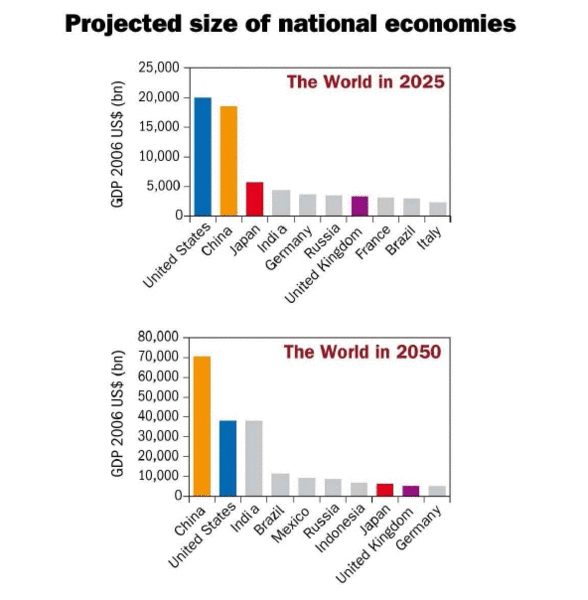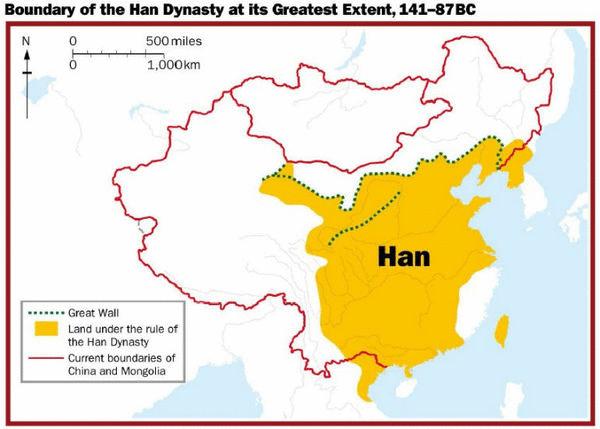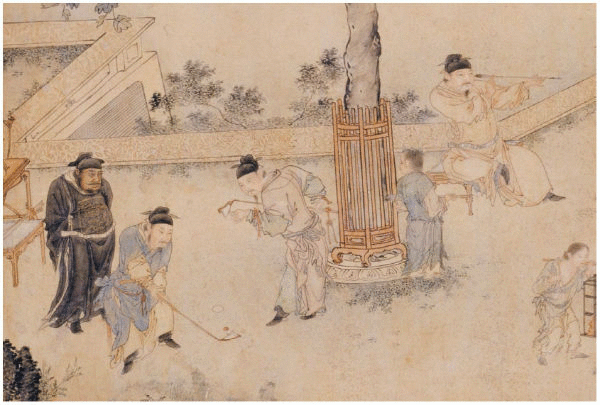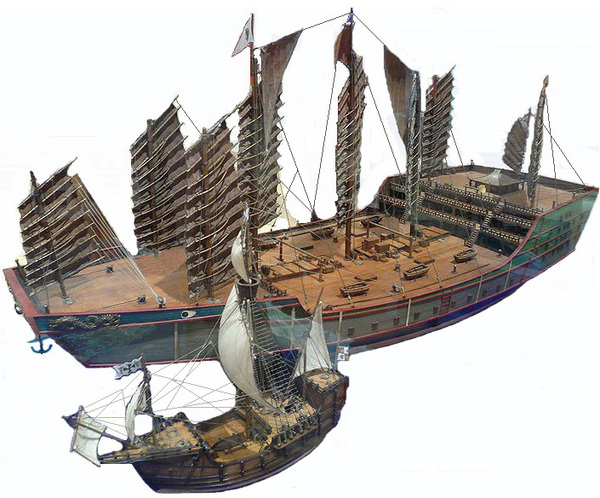

 字體:小 中 大
字體:小 中 大 |
|
|
|
| 2012/03/02 06:02:08瀏覽2510|回應3|推薦26 | |
|
The world is changing with really remarkable speed. If you look at the chart at the top here, you'll see that in 2025, these Goldman Sachs projections suggest that the Chinese economy will be almost the same size as the American economy. And if you look at the chart for 2050, it's projected that the Chinese economy will be twice the size of the American economy, and the Indian economy will be almost the same size as the American economy. And we should bear in mind here that these projections were drawn up before the Western financial crisis. 世界正以驚人的速度發生著變化。請看上方的這張圖表,根據高盛(Goldman Sachs)的預測,我們會發現到2025年中國的經濟規模將會和美國幾乎并駕齊驅。 再看一下這張圖表,到2050年為止中國的經濟規模將會是美國的兩倍,屆時印度的經濟規模將會追平美國。 但我們須知道,上述結論均是基於西方金融危機爆發前所做出的預測。
A couple of weeks ago, I was looking at the latest projection by BNP Paribas for when China will have a larger economy than the United States. Goldman Sachs projected 2027. The post-crisis projection is 2020. That's just a decade away. China is going to change the world in two fundamental respects. First of all, it's a huge developing country with a population of 1.3 billion people, which has been growing for over 30 years at around 10 percent a year. 約幾個禮拜之前我去看巴黎銀行的最新預測, 他們正在估算中國的經濟規模會在何時超越美國。高盛給出的答案是在2027年。而金融危機爆發後的最新預測則是在2020年。 而這只不過十年之間,中國就將會在兩個基本層面上改變世界。首先,中國是個擁有13億人口的龐大的發展中國家,它在過去的30年中的年增長速度在10%左右。 And within a decade, it will have the largest economy in the world. Never before in the modern era has the largest economy in the world been that of a developing country, rather than a developed country. Secondly, for the first time in the modern era, the dominant country in the world -- which I think is what China will become -- will be not from the West and from very, very different civilizational roots. 中國將會在接下來的10年之內成爲世界最大的經濟體。要知道在現代文明史上, 從沒有一個來自發展中的國家會成為世界最大的經濟強權,這是發達國家才有可能做到的事情。 其次, 我個人認為,在現代史上,中國將成為首個來自非西方文明而的主宰世界的國家, 這是個和西方世界迥然不同的(東方)古老文明。 Now, I know it's a widespread assumption in the West that as countries modernize, they also westernize. This is an illusion. It's an assumption that modernity is a product simply of competition, markets and technology. It is not. It is also shaped equally by history and culture. China is not like the West, and it will not become like the West. It will remain in very fundamental respects very different. Now the big question here is obviously, how do we make sense of China? How do we try to understand what China is? And the problem we have in the West at the moment, by and large, is that the conventional approach is that we understand it really in Western terms, using Western ideas. We can't. Now I want to offer you three building blocks for trying to understand what China is like, just as a beginning. 我知道西方國家普遍有這樣的迷思: 一個國家的現代化也就意味著西化。 這種想法不過是個錯覺。 之所以會有這種想法是因為我們只是簡單地將現代化看做是由競爭、市場和科技所形成的產物。 但事實並非如此, 現代化其實也同樣受到歷史和文化的影響。 中國和西方國家不同, 而且中國也不可能成為西方國家那樣。 中國會在各個方面繼續保持與西方世界的差異。 顯而易見,現在最大的問題就是我們(西方)該如何來解讀中國? 我們該如何去了解中國這個國家呢? 總的來說,西方現在的問題在於我們總是以西方的那套思維定式去解讀中國。這樣是不行的。現在我想給諸位提供三個基本理由去試著了解中國。 The first is this: that China is not really a nation-state. Okay, it's called itself a nation-state for the last hundred years, but everyone who knows anything about China knows it's a lot older than this. This was what China looked like with the victory of the Qin Dynasty in 221 B.C. at the end of the warring-state period -- the birth of modern China. And you can see it against the boundaries of modern China. Or immediately afterward, the Han Dynasty, still 2,000 years ago. And you can see already it occupies most of what we now know as Eastern China, which is where the vast majority of Chinese lived then and live now. 首先,中國其實并不能稱之為一個國土意義上的“國家”。雖然在最近的100年來中國一直自稱為是這樣的一個“國家”。 但任何熟悉中國的人都知道, 中國的歷史豈止100年。這張是西元前221年中國當時的疆域圖, 秦滅六國統一天下結束了戰國時代,他是現代中國的雛形。 諸位可以看到這是現代中國的國界線。 這張圖是秦之後的漢朝的疆域圖, 它來自於距今兩千年前。 你們可以看到當時中國已經擁有了現在中國東部的大部分區域。 這個區域從古至今一直以來都是絕大多數的中國人居住的地方。
Now what is extraordinary about this is, what gives China its sense of being China, what gives the Chinese the sense of what it is to be Chinese, comes not from the last hundred years, not from the nation-state period, which is what happened in the West, but from the period, if you like, of the civilization-state. I'm thinking here, for example, of customs like ancestral worship, of a very distinctive notion of the state, likewise, a very distinctive notion of the family, social relationships like guanxi, Confucian values and so on. These are all things that come from the period of the civilization-state. In other words, China, unlike the Western states and most countries in the world, is shaped by its sense of civilization, its existence as a civilization-state, rather than as a nation-state. And there's one other thing to add to this, and that is this: Of course we know China's big, huge, demographically and geographically, with a population of 1.3 billion people. What we often aren't really aware of is the fact that China is extremely diverse and very pluralistic, and in many ways very decentralized. You can't run a place on this scale simply from Beijing, even though we think this to be the case. It's never been the case. (那我要問的是)是什麼原因使得中國如此之卓爾不凡呢? 是什麼讓中國如此之“中國”? 又是什麼讓中國人這樣得“中國化”呢? 所有的這一切不能只從最近的100年來看起, 也不能像我們西方的歷史那樣,從產生“國家” 的概念之時去研究, 我們應該從兩千年前那時的(中國)“民族國家”著手去看。譬如,中國人有祭拜祖先的習俗、 中國人對 “國家” 的觀念和我們截然不同。與此類似的是,他們對 “家庭” 的定義也與我們不同。還有就是他們對社會人際“關係”的理解以及儒家文化的價值觀等等。 上述這些都是從二千年前的中國就已經有的文化。 換句話來說,中國和西方諸國甚至世界上大部分的國家都不同,中國擁有自己的獨特文明體系,并以此所形成的“民族國家” 的形式存諸於世, 這種方式絕非西方意義上 的“國家”觀念。 對此我想補充説明一下。我們都知道,中國無論從人口還是國土面積來講都是個龐大的國家, 他擁有13億人口。 但有個情況我們可能會忽略,那就是,中國實際上是個極其多樣性,多元化的國家,在很多事情上中央把權力下放給地方。 因為要從北京管理全中國這麽大的地方是件不太可能的事情, 雖然我們覺得理應如此, 但事實上卻并非這樣。 So this is China, a civilization-state, rather than a nation-state. And what does it mean? Well, I think it has all sorts of profound implications. I'll give you two quick ones. The first is that the most important political value for the Chinese is unity, is the maintenance of Chinese civilization. You know, 2,000 years ago, Europe: breakdown -- the fragmentation of the Holy Roman Empire. It divided, and it's remained divided ever since. China, over the same time period, went in exactly the opposite direction, very painfully holding this huge civilization, civilization-state, together. 這就是中國,一個建筑在文化基礎上的“民族國家”,而不是我們西方概念上的“國家”。 那麽這意味著什麼呢? 我認為這有多層的意涵。 我舉兩個簡單的例子加以說明。 首先, 對中國人而言,最重要的政治價值觀是追求大一統并維護中華文明。 諸位都知道,2000年前因為神圣羅馬帝國的瓦解,歐洲分崩離析一直到今天都是如此。 但中國卻在同一時期走向一條和我們西方截然相反的“統一”之路, 并在其後竭盡全力地維護著這個龐大的文明和“民族國家”之完整。 The second is maybe more prosaic, which is Hong Kong. Do you remember the handover of Hong Kong by Britain to China in 1997? You may remember what the Chinese constitutional proposition was. One country, two systems. And I'll lay a wager that barely anyone in the West believed them. "Window dressing. When China gets its hands on Hong Kong, that won't be the case." Thirteen years on, the political and legal system in Hong Kong is as different now as it was in 1997. We were wrong. Why were we wrong? We were wrong because we thought, naturally enough, in nation-state ways. Think of German unification, 1990. What happened? Well, basically the East was swallowed by the West. One nation, one system. That is the nation-state mentality. But you can't run a country like China, a civilization-state, on the basis of one civilization, one system. It doesn't work. So actually the response of China to the question of Hong Kong -- as it will be to the question of Taiwan -- was a natural response: one civilization, many systems. 再有,是香港問題,可能相對地來得沒那麼突出。大家都還記得香港在1997年從英國的手上交還給中國,當時中國制訂了“一國兩制”的憲法。 我敢說打賭,當時西方國家大概沒幾個人會相信這樣的政策,大都認為『這只是中國官方的場面話。 等中國真的回收香港之後是不可能嚴格執行一國兩制的。』 但看看13年後的今天,香港的政治和法律制度依然和1997年回歸之前一樣,和中國大陸的那套完全不同。 我們錯了。爲啥?因爲我們想當然地把我們西方人對“國家”的那套思維模式照搬到了中國的身上。 回顧一下1990年的東西德合并, 當時發生過什麼事情呢? 基本上來講,東德最終被西德併吞了,變成了 “一國一制。” 這就是我們西方的國家思維方式。 但是你不能用這個西方對“國家”的理解(“一國一制”)去處理中國這種的建立在“民族國家”概念上的國家。 這顯然是行不通的。 所以中國對香港問題的處理方式將來也可以很自然地用於臺灣問題上,即“ 一國多制”。 Let me offer you another building block to try and understand China -- maybe not sort of a comfortable one. The Chinese have a very, very different conception of race to most other countries. Do you know, of the 1.3 billion Chinese, over 90 percent of them think they belong to the same race, the Han? Now, this is completely different from the world's [other] most populous countries. India, the United States, Indonesia, Brazil -- all of them are multiracial. The Chinese don't feel like that. China is only multiracial really at the margins. So the question is, why? Well the reason, I think, essentially is, again, back to the civilization-state. A history of at least 2,000 years, a history of conquest, occupation, absorption, assimilation and so on, led to the process by which, over time, this notion of the Han emerged -- of course, nurtured by a growing and very powerful sense of cultural identity. 現在請讓我再提供給諸位另一個觀點來試著了解中國, 這個觀點也許不那麼讓人舒服。 中國人對民族的觀念 跟其他大部分的國家比起來 有極大的差別。 你知道嗎? 在13億中國人裏 有90%以上的人 都認爲自己是屬於同一民族:漢族。 這跟世界上 其他人口衆多的國家是完全不一樣的, 例如印度、美國 、印尼、巴西, 這些國家都是多種族的。 但中國人卻不認爲如此。 若勉爲其難地稱中國是個多種族國家, 那也就是在邊陲地區的那些少數民族。 因此,我們要問,爲什麽會這樣呢? 理由很簡單,我認為基本上 又回到上一個話題──中國是一個 以文化而形成的“民族國家”。 中國擁有超過2000年的歷史,其中充滿了征服、佔領、 吸收、同化等等。 在這經年累月的過程中衍生了漢民族的概念。這個概念由於文化的認同感而愈發堅固。 Now the great advantage of this historical experience has been that, without the Han, China could never have held together. The Han identity has been the cement which has held this country together. The great disadvantage of it is that the Han have a very weak conception of cultural difference. They really believe in their own superiority, and they are disrespectful of those who are not. Hence their attitude, for example, to the Uyghurs and to the Tibetans. 這段歷史經驗的最大好處在於它告訴了我們,假如沒有漢民族, 中國是不可能統一的。 漢民族一直像是膠水一樣把這個國家牢牢地凝聚在一起。 同時他們的最大缺點是漢人對其他文明的差異性非常薄弱。 因為漢人篤信自己種族的優秀, 同時又看不大起其它族群。比如他們對待維吾爾族或藏族的態度。 Or let me give you my third building block, the Chinese state. Now the relationship between the state and society in China is very different from that in the West. Now we in the West overwhelmingly seem to think -- in these days at least -- that the authority and legitimacy of the state is a function of democracy. The problem with this proposition is that the Chinese state enjoys more legitimacy and more authority amongst the Chinese than is true with any Western state. And the reason for this is because -- well, there are two reasons, I think. And it's obviously got nothing to do with democracy, because in our terms the Chinese certainly don't have a democracy. And the reason for this is, firstly, because the state in China is given a very special -- it enjoys a very special significance as the representative, the embodiment and the guardian of Chinese civilization, of the civilization-state. This is as close as China gets to a kind of spiritual role. 現在我提出第三個理由: 中國式的國家。 現在的中國, 國家和社會的關係 跟西方國家有極大的差異。 現在我們西方國家 絕大多數的人似乎會認為,至少在現今, 國家的權力和合法性 是民主的功能。 這個論述的問題在於, 在中國 人民享有更多的 合法性 及權力 如跟任何西方國家 相比較。 我認爲,它的理由 是因為兩個原因。而且這兩個原因很明顯都和民主一點關係都沒有, 因為以我們的標準來看,很確定的是中國沒有民主。 原因一: 首先,在中國,國家是一個非常特殊的概念, 它是中華文明的代表及化身, 也是中華文明及 “文化國家” 的捍衛者。 它的地位近乎一種精神式的象徵。 And the second reason is because, whereas in Europe and North America, the state's power is continuously challenged -- I mean in the European tradition, historically against the church, against other sectors of the aristocracy, against merchants and so on -- for 1,000 years, the power of the Chinese state has not been challenged. It's had no serious rivals. So you can see that the way in which power has been constructed in China is very different from our experience in Western history. The result, by the way, is that the Chinese have a very different view of the state. Whereas we tend to view it as an intruder, a stranger, certainly an organ whose powers need to be limited or defined and constrained, the Chinese don't see the state like that at all. The Chinese view the state as an intimate -- not just as an intimate actually, as a member of the family -- not just in fact as a member of the family, but as the head of the family, the patriarch of the family. This is the Chinese view of the state -- very, very different to ours. It's embedded in society in a different kind of way to what is the case in the West. 第二個原因, 在歐洲 及北美洲 國家的權力不斷地受到挑戰。我指的是歐洲傳統上, 在歷史上不斷受到來自於教廷,其他派別的貴族及商人等方面的挑戰。然而,1000年來 “國家” 的地位在中國從未被挑戰過。 中國還沒有強力的對手與之抗衡。 因此你可以看出, 中國權力建構的方式 從我們西方的歷史經驗來看 二者是十分迥異的。 因此, 中國對 “國家” 的觀念和我們截然不同。 我們傾向視國家為侵入者、 外來者, 而且理所當然的,國家是一個機構, 它的權利需要被限制、 定義及約束, 然而,中國人對 “國家” 的看法並非如此。 在他們的觀念裏, 國家和他們是緊密相連的,不僅僅是普通的緊密, 而是像家族成員那樣的緊密, 而且國家不僅是家族的一員 更是家族的 大家長。 這是中國人的國家觀, 完全不同於我們西方人的想法。 中國人的國家與社會連結的模式 是有別於西方國家的。 And I would suggest to you that actually what we are dealing with here, in the Chinese context, is a new kind of paradigm, which is different from anything we've had to think about in the past. Know that China believes in the market and the state. I mean, Adam Smith, already writing in the late 18th century, said, "The Chinese market is larger and more developed and more sophisticated than anything in Europe." And, apart from the Mao period, that has remained more or less the case ever since. But this is combined with an extremely strong and ubiquitous state. The state is everywhere in China. I mean, it's leading firms -- many of them are still publicly owned. Private firms, however large they are, like Lenovo, depend in many ways on state patronage. Targets for the economy and so on are set by the state. And the state, of course, its authority flows into lots of other areas -- as we are familiar with -- with something like the one-child policy. 我想要建議的是,我們現在所要處理的, 是以中國為背景的 一種新的模式, 這跟我們西方國家過去所想的 截然不同。 知道嗎? 中國相信市場及國家的效用。 我的意思是,亞當史密斯 早在18世紀晚期就已經寫道: 『中國市場比任何歐洲市場 都還要大,都還要發達 而且還要複雜。』 除了在毛澤東時期外, 一直到現在亞當斯密的觀點大致是正確的。 但這樣的市場 是因為有一個十分強力的國家為後盾。 在中國,“國家” 是無處不在的。 國家帶領企業的發展, 很多企業到現在還是國有。 私人企業再怎麽大,在很多方面 還是需要依賴國家的資助,例如聯想電腦。 經濟成長等目標 是由國家設定。 此外,國家的權力還延伸至其他很多的領域, 例如我們所熟知的 一胎化政策。 Moreover, this is a very old state tradition, a very old tradition of statecraft. I mean, if you want an illustration of this, the Great Wall is one. But this is another, this is the Grand Canal, which was constructed in the first instance in the fifth century B.C. and was finally completed in the seventh century A.D. It went for 1,114 miles, linking Beijing with Hangzhou and Shanghai. So there's a long history of extraordinary state infrastructural projects in China, which I suppose helps us to explain what we see today, which is something like the Three Gorges Dam and many other expressions of state competence within China. So there we have three building blocks for trying to understand the difference that is China -- the civilization-state, the notion of race and the nature of the state and its relationship to society. 再來,這是個很悠久的國家傳統, 很古老的治國權術。 我的意思是,如果你想要看這樣的例子, 請看萬里長城。 此外還有一個例子:京杭大運河。 它始建於公元前五世紀, 完工於公元七世紀。 全長1114英里, 連接了北京,杭州和上海。 因此,在中國由國家主導的大型基礎建設工程已有悠久的歷史。 這或許有助於我們來解釋諸如三峽大壩這樣的工程, 或是中國境內其他在可以展現國家實力的建設。 因此,這就是我的三個基本的理由用來了解中國和西方的差異: 文明基礎上形成的 “民族國家”、 民族的觀念、國家的屬性以及國家,人民與社會的關係。 And yet we still insist, by and large, in thinking that we can understand China by simply drawing on Western experience, looking at it through Western eyes, using Western concepts. If you want to know why we unerringly seem to get China wrong -- our predictions about what's going to happen to China are incorrect -- this is the reason. Unfortunately, I think, I have to say that I think attitude towards China is that of a kind of little Westerner mentality. It's kind of arrogant. It's arrogant in the sense that we think that we are best, and therefore we have the universal measure. And secondly, it's ignorant. We refuse to really address the issue of difference. You know, there's a very interesting passage in a book by Paul Cohen, the American historian. And Paul Cohen argues that the West thinks of itself as probably the most cosmopolitan of all cultures. But it's not. In many ways, it's the most parochial, because for 200 years, the West has been so dominant in the world that it's not really needed to understand other cultures, other civilizations. Because, at the end of the day, it could, if necessary by force, get its own way. Whereas those cultures -- virtually the rest of the world, in fact, which have been in a far weaker position, vis-a-vis the West -- have been thereby forced to understand the West, because of the West's presence in those societies. And therefore, they are, as a result, more cosmopolitan in many ways than the West. 然而,我們西方國家還是偏執地認為僅僅簡單地憑藉我們西方自身的經驗, 用我們的眼光及觀念就能了解中國。 這就是爲什麽我們屢屢誤解中國。 這就是爲什麽我們對中國的預測不準確。原因就在這裡。 很不幸, 我必須說,我們對中國的態度只是一種狹隘的西方人的心態, 這是一種傲慢的心態。它代表著我們自認為是世界上最優秀的, 世界規則和標準應該由我們西方來制訂。 再來,就是無知。 我們拒絕認真處理對待東西方的差異這個問題。 著名的美國歷史學家保羅柯恩 ( Paul Cohen)在自己的書中曾有一段非常有趣的敘述。 他說:“西方國家認爲自己的文化大概是所有文化中最具有世界的。 但事實並非如此。 在很多方面 它恰恰是最狹隘的, 因爲200年以來西方國家一直在這世界上占據領先地位, 致使西方人認為自己不需要去了解其它的文化及文明。 如果真的有必要去了解的話,可以用武力征服來達成目標。 然而那些其他的文明和文化,就是西方國家以外的文化, 相對於西方文化一直以來處於弱勢地位, 他們也因此被迫去了解西方文化, 因為西方文化已經影響了那些社會。 因此,這些社會反而在很多方面都比西方人更具有世界觀”。 I mean, take the question of East Asia. East Asia: Japan, Korea, China, etc. -- a third of the world's population lives there. Now the largest economic region in the world. And I'll tell you now, that East Asianers, people from East Asia, are far more knowledgeable about the West than the West is about East Asia. Now this point is very germane, I'm afraid, to the present. Because what's happening? Back to that chart at the beginning, the Goldman Sachs chart. What is happening is that, very rapidly in historical terms, the world is being driven and shaped, not by the old developed countries, but by the developing world. We've seen this in terms of the G20 usurping very rapidly the position of the G7, or the G8. And there are two consequences of this. First, the West is rapidly losing its influence in the world. There was a dramatic illustration of this actually a year ago -- Copenhagen, climate change conference. Europe was not at the final negotiating table. When did that last happen? I would wager it was probably about 200 years ago. And that is what is going to happen in the future. 以東亞的問題來講, 東亞國家如日本、韓國、中國等, 世界上三分之一的人口住在那裏, 現在那邊已是全球最大的經濟區域。 我現在可以告訴你, 東亞地區的人對西方國家的認識, 遠遠超過了西方對東亞的認知。 而且我也必須講,這個觀點完全符合目前的情況。怎麼會是這樣? 讓我們再回過頭看看之前的那張高盛的預測圖。 以歷史的術語來說, 當前世界正在發生的這樣的事情:引領這個世界的將很快不再是已開發國家,而將是那些發展中的國家。 正如我們所見到的: G20高峰會快速地取代了G7高峰會或G8高峰會的地位。 這產生了兩個結果: 首先,西方國家對這個世界的影響力正在快速削弱。 1年前有個很戲劇性的例子:哥本哈根的世界氣候會議。 最後的談判桌上竟然沒有歐洲人的身影。 上次歐洲被摒除在談判桌外是什麽時候的事呢?大概是200年以前吧! 但這個悲劇在未來即將重演。 And the second implication is that the world will inevitably, as a consequence, become increasingly unfamiliar to us, because it'll be shaped by cultures and experiences and histories that we are not really familiar with, or conversant with. And at last, I'm afraid -- take Europe; America is slightly different -- but Europeans by and large, I have to say, are ignorant, are unaware about the way the world is changing. Some people -- I've got an English friend in China, and he said, "The continent is sleepwalking into oblivion." Well, maybe that's true, maybe that's an exaggeration. But there's another problem which goes along with this -- that Europe is increasingly out of touch with the world -- and that is a sort of loss of a sense of the future. I mean, Europe once, of course, once commanded the future in its confidence. Take the 19th century, for example. But this, alas, is no longer true. 其次, 暗示了這個世界將無可避免地變得和我們越來越疏離, 因為這世界將會受到我們所不熟悉的文化、經驗及歷史的影響。 最後,我很怕拿歐洲的例子來説, 美國的情況稍有不同, 但是我必須要說,歐洲人總體上來講是無知的, 他們仍未意識到世界情勢正在變化。 有些人,比如我有一位在中國的英國朋友, 他說:『整個歐洲因為像在夢遊般搞不清楚狀況而逐步被世人遺忘。』 這也許誇張了一點,但可能是真的。隨著這個問題而來的另一個問題, 就是歐洲已越來越和這個世界脫節, 這其實也是對未來的茫然和失落。 我是想說歐洲曾在19世紀經意氣風發地引領過世界的未來。但可惜,如今世界情勢已然變了。 If you want to feel the future, if you want to taste the future, try China -- there's old Confucius. This is a railway station the likes of which you've never seen before. It doesn't even look like a railway station. This is the new Guangzhou railway station for the high-speed trains. China already has a bigger network than any other country in the world and will soon have more than all the rest of the world put together. Or take this: now this is an idea, but it's an idea to be tried out shortly in a suburb of Beijing. Here you have a megabus, on the upper deck carries about 2,000 people. It travels on rails down a suburban road, and the cars travel underneath it. And it does speeds of up to about 100 miles an hour. Now this is the way things are going to move, because China has a very specific problem, which is different from Europe and different from the United States: China has huge numbers of people and no space. So this is a solution to a situation where China's going to have many, many, many cities over 20 million people. 你若是想要感覺或體會未來會是什麽樣, 你該到中國走走看看,那兒有孔夫子。 (看下這張圖)這是座火車站, 你應該從來沒有看過這樣子的火車站吧。 它甚至看起來一點都不像座火車站。 這個(圖)是新的廣州火車站, 廣州高速鐵路站。 中國已經擁有了世界上最大的鐵路網, 而且用不了多久就會超過世界其他鐵路網的總合。 來看下這個(圖):這是新的創意, 也許這個創意很快將會在北京的郊區投入試驗。 這是一台超級公交車,上層可乘座大約2000人。它在軌道上運行,軌道下方是一條往郊區的道路, 汽車就在軌道下方穿梭行駛。它的時速可達100英里。這是未來發展的一個趨勢。和歐洲與美國的情況都不同,中國有個很特殊的問題,它有龐大的人口但空間有限。它的很多城市的人口都超過2千萬以上。 因此,北京的這個試驗可為其它城市提供一個可供參考解決的方案。 Okay, so how would I like to finish? Well, what should our attitude be towards this world that we see very rapidly developing before us? I think there will be good things about it and there will be bad things about it. But I want to argue, above all, a big-picture positive for this world. For 200 years, the world was essentially governed by a fragment of the human population. That's what Europe and North America represented. The arrival of countries like China and India -- between them 38 percent of the world's population -- and others like Indonesia and Brazil and so on, represent the most important single act of democratization in the last 200 years. Civilizations and cultures, which had been ignored, which had no voice, which were not listened to, which were not known about, will have a different sort of representation in this world. As humanists, we must welcome, surely, this transformation, and we will have to learn about these civilizations. 我該如何給我的這次演說收尾呢? 我們該用怎樣的態度來面對這個迅速變化中的世界呢? 我們對此或許會喜憂參半。 但是不管如何, 總體上講,這個世界對我們而言將會有一個較為積極樂觀的前景。 200年來, 我們的世界基本上是由全球人口中的一部分人所統治的, 歐洲和北美就是典型的代表。 其它國家如中國和印度(這兩國擁有世界38%的人口)還有諸如像印尼和巴西等國家的崛起,展現了過去200年來最為重要的一次民主化過程。 過去那些曾被忽視的、不為人知沒有話語權的文化和文明將會在這個世界上百花齊放。身為人道主義者,我們當然樂見這樣的轉變。 而且我們將必須去學習這些文明。
This big ship here was the one sailed in by Zheng He in the early 15th century on his great voyages around the South China Sea, the East China Sea and across the Indian Ocean to East Africa. The little boat in front of it was the one in which, 80 years later, Christopher Columbus crossed the Atlantic. (Laughter) Or, look carefully at this silk scroll made by ChuZhu in 1368. I think they're playing golf. Christ, the Chinese even invented golf. (下圖)這艘大船是15世紀初中國鄭和下西洋時所使用的艦船, 這次偉大航行从中國的東海出發,行經南海穿越印度洋最終到逹非洲的東部。 在這艘船前面的這艘小船是80年後 哥倫布橫渡大西洋時所駕駛的(觀眾笑聲)。看仔細點,這幅畫可是中國古代畫家(音譯)在公元1368年所畫,我發現他們這群人正在打高爾夫球。老天哪,就連高爾夫球竟然也是中國人發明的! Welcome to the future. Thank you. 歡迎到未來。謝謝大家。 (Applause) (觀眾掌聲)
註1: http://www.ted.com Speaking at a TED Salon in London, economist Martin Jacques asks: How do we in the West make sense of China and its phenomenal rise? The author of "When China Rules the World," he examines why the West often puzzles over the growing power of the Chinese economy, and offers three building blocks for understanding what China is and will become. 註2:TEDTalks is a daily video podcast of the best talks and performances from the TED Conference, where the world's leading thinkers and doers give the talk of their lives in 18 minutes. Featured speakers have included Al Gore on climate change, Philippe Starck on design, Jill Bolte Taylor on observing her own stroke, Nicholas Negroponte on One Laptop per Child, Jane Goodall on chimpanzees, Bill Gates on malaria and mosquitoes, Pattie Maes on the "Sixth Sense" wearable tech, and "Lost" producer JJ Abrams on the allure of mystery. TED stands for Technology, Entertainment, Design, and TEDTalks cover these topics as well as science, business, development and the arts. Closed captions and translated subtitles in a variety of languages are now available on TED.com, at http://www.ted.com/translate. 註3:Martin Jacques (born October 1945) is a British former magazine editor and academic. He was born and raised in Coventry. He was an undergraduate student at Manchester University, where he graduated with a first-class honours degree, and subsequently studied for a PhD at King's College, Cambridge. He was editor of the CPGB's journal, Marxism Today from 1977 until its closure in 1991, a publication which was politically quite mainstream in its final years, with regular contributions from figures generally identified with the Atlanticist left such as David Marquand. In this period, Jacques was the co-editor or co-author of The Forward March of Labour Halted? (1981), The Politics of Thatcherism (1983) and New Times (1989). Jacques was a co-founder of the think-tank Demos. He has been a columnist for The Times and The Sunday Times and was deputy editor of The Independent. Currently he is a visiting fellow at the London School of Economics Asia Research Centre. During the last year he has been a visiting professor at the International Centre for Chinese Studies at Aichi University in Japan, a visiting professor at Renmin University in Beijing and a senior visiting fellow at the Asia Research Institute, National University of Singapore. In 2009, Jacques' book about Asian modernity and the rise of China entitled When China Rules the World: The End of the Western World and the Birth of a New Global Order was published. He is a columnist for The Guardian and New Statesman. |
|
| ( 不分類|不分類 ) |













